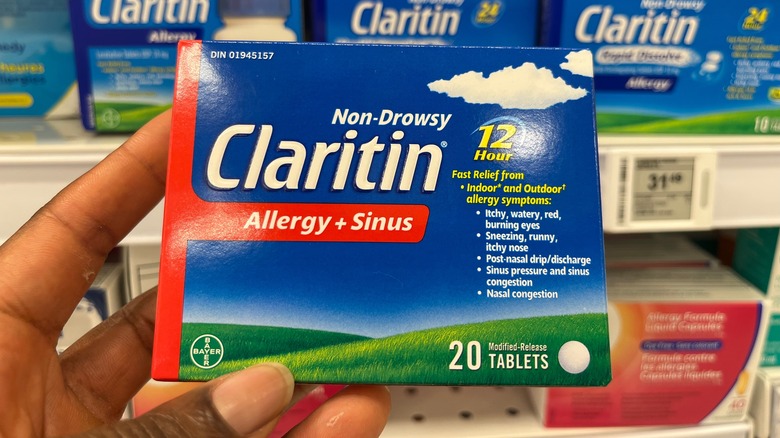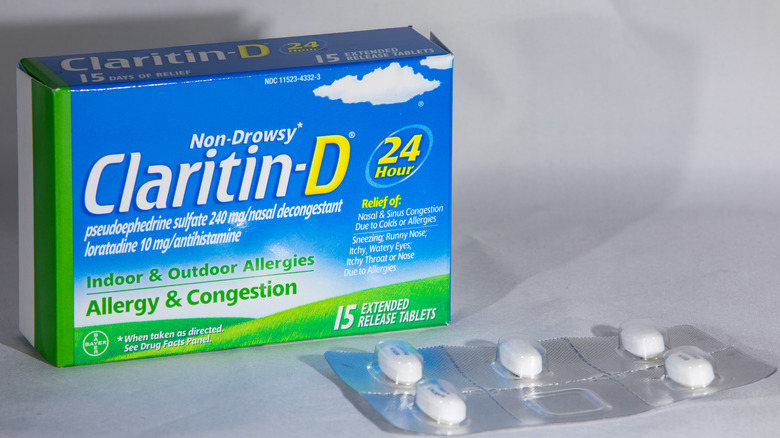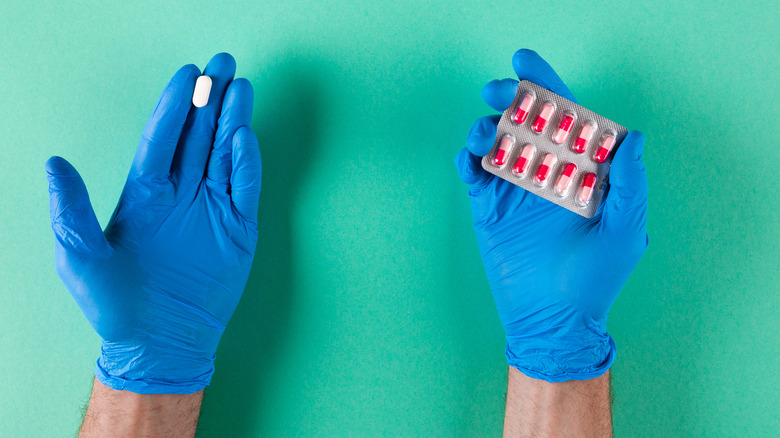Claritin Explained: Usage, Dosage, And Side Effects
Allergic rhinitis (also referred to as hay fever) involves an allergic reaction to triggers such as mold, pollen, dust mites, and hair from your favorite pets, according to Medical News Today. It may lead to some uncomfortable cold-like symptoms like sneezing, itchiness in the throat, watery eyes, runny nose, loss of taste and smell, and pain in your face. Claritin (also known as loratadine) is a popular antihistamine that eases these and other nasty symptoms that may arise in the upper respiratory tract (per RxList).
ClinCalc says that in the United States, Claritin was part of almost 10,000,000 prescriptions in 2020 alone, and almost 2.7 million patients that year used it. Its demand from 2013 to 2020 has been somewhat steady. In 2021, about 50% of U.S. adults with allergies used some type of antihistamine, and about 26% used a combination of drugs that may include Claritin (via Statista) — meaning that antihistamines such as Claritin are standing out as a reliable intervention.
Here, we explore what makes Claritin effective and dependable in the long term, and how best to use it to get maximum positive effects and minimal-to-no negative effects.
It comes in varying forms
Claritin is available in various forms and different concentration levels, per MedBroadcast. Depending on its purpose, you can classify Claritin under three different categories: Claritin for adult allergies, Claritin-D for adult allergies with sinus pressure and nasal congestion, and Children's Claritin for kids' allergies (via Claritin's website).
In the Claritin category, there are non-drowsy Claritin Tablets 24-hour which deal with symptoms like sneezing, throat and nose itchiness, runny nose, and itchy eyes that get watery. You're required to take the tablets with water, and their effect lasts 24 hours. There are also Claritin Liqui-Gels 24-hour and Claritin Cool Mint Chewables 24-hour, both of which offer all-day protection. Non-drowsy Claritin RediTabs 12-hour tablets don't require water and offer relief that lasts half a day. If you want RediTabs that go for a whole day and don't require water, the Claritin RediTabs 24-hour tablets are your best bet.
In the Claritin-D category, there are two products: Claritin-D 12-hour and Claritin-D 24-hour tablets. Both offer relief from allergic symptoms combined with nasal and sinus congestion and sinus pressure, but for varying durations. Lastly, the Children's category includes chewables with effects that last a day (for 2-year-olds and above), RediTabs that can go for 12 and 24 hours (for 6-year-olds and above), and syrup that works for a whole day (for 2-year-olds and above).
How to use Claritin
Claritin should be consumed based on your doctor's recommendations, or the instructions on the label of the product you buy. If your doctor prescribes it, you should work with the specific instructions they provide, as they are optimized for your specific case — as opposed to the label, which may be useful but generic, says iCliniq. Keep in mind that before your doctor gives you a prescription, they consider your body weight, any health issues you may be having, and other medications you're on (via MedBroadcast).
Claritin helps with urticaria (commonly known as hives), a condition that causes itchy, swollen patches of skin after you are exposed to allergic triggers. It reduces itchiness and rashes, and may also neutralize upper respiratory symptoms like sneezing, runny nose, redness, swollen and watery eyes, and itchy throat, nose, and eyes.
If you experience anaphylaxis, however, Claritin shouldn't be used in place of an EpiPen, notes the National Library of Medicine. You also shouldn't use Claritin if your hives are blistered or bruised, have an unusual color, or don't itch. Instead, you should contact your doctor.
How you should take Claritin
For adults (and children above the age of 6) with upper respiratory allergic symptoms, urticaria, or hay fever symptoms, the typical dose is 10 milligrams of Claritin once per day. Per Drugs.com, you should not go beyond that. Adults can have the regular tablets with or without food, but you should only take the rapid-dissolving tablets on an empty stomach. Kids who are at least 2 years old should use the children's syrup. The exact dosage depends on the child's age. For children who are 2 to 5 years old and have upper respiratory allergies, urticaria, or hay fever symptoms, a maximum oral dose of 5 milligrams daily, taken once per day, tends to work well.
In case you forget to take your dose (or to give your child their dose) and remember when it's almost time for the next dose, you should forego the previous dose and simply have the next. You shouldn't take more than one dose per day, so taking the missed dose is only allowed if you remember not long after missing it. Unintentionally overdosing on Claritin brings side effects that may even require you to receive emergency services, warns Medicover Hospitals. If you overdose, Drugs.com recommends calling Poison Control.
It's worth noting that while adults and teenagers can work with Claritin for a period of half a year, children aged 2 to 12 should only take it for two weeks or less, unless a doctor has prescribed otherwise (via MedBroadcast).
Claritin and pregnancy
Many pregnant women who have allergies get worried about using medication for allergies due to safety reasons. The good news is that like many antihistamines, Claritin is considered safe to take while pregnant, says Medical News Today. Nonetheless, you should only use it when necessary, and you should discuss its usage with your doctor in order to receive proper guidance and optimal results.
Bumps adds that you shouldn't get worried if the baby's father used Claritin prior to your pregnancy, as it won't affect you or your baby. Per Medical News Today, Cetirizine is also another reliable allergy medication for those who are pregnant. However, these medications, like other antihistamines approved for use while pregnant, should not be used together with decongestants such as pseudoephedrine, as this combination may put the mother-to-be and unborn baby at risk, and may also exhaust the mother's breast milk supply. While Claritin is considered safe, you should be careful with the doses you consume, as the medication can pass through breast milk. Aiming for low doses within a short timeframe is the best way to go.
In case you don't want to use any form of medication while you're pregnant, other interventions you can discuss with your doctor include nasal irritation (where you run sterile water through your nasal pathways to minimize allergen particles and mucus that may cause allergic reactions), head elevation (when you're relaxing or sleeping), and saline nasal sprays.
Products made from a combination of Claritin and other drugs
Alavert D is a drug that's made of both pseudoephedrine and loratadine, according to MedlinePlus. WebMD explains that the drug helps to reduce common allergy symptoms like watery eyes, sneezing, itchiness, and runny nose.
Pseudoephedrine is a popular decongestant that aims to free your nose from stuffiness and help your breathing process run more seamlessly (via the National Health Service). It's also referred to by other names such as care decongestant, Sudafed, boots decongestant, and Galpseud. It decreases swelling in the nasal cavities, and allows air and mucus to move without problems.
Upon taking Alavert D, you can expect the effects to kick in within 15 minutes to an hour. It is only intended for short-term use. Due to the presence of pseudoephedrine, Alavert D should only be used by people ages 12 and older. Keeping in mind that pregnant people generally shouldn't take pseudoephedrine, particularly during the first trimester, Alavert D isn't a good fit for them unless their doctor says otherwise.
Allegra versus Claritin
Allegra (also called fexofenadine) is a well-known medication that also treats hives and allergies. Many people use it as an alternative to Claritin. The two medications share some similarities but also have some distinct differences.
GoodRx Health notes that, in terms of differences, you can take Allegra one or two times each day, while you can only have Claritin once per day. Children below the age of 12 years cannot have the Allegra oral tablet, whereas with Claritin, children as young as 6 years can take the oral tablet without issues (per The Checkup by Singlecare). The standard dosage for Allegra is 60 to 180 milligrams, while for Claritin, it is 5 to 10 milligrams. Some research suggests that Claritin may provide more and faster relief from allergy symptoms than Allegra. Moreover, Claritin is somewhat cheaper than Allegra.
Both Claritin and Allegra are known to cause sleepiness as a side effect in some people, but less often in comparison to antihistamines such as Benadryl, says GoodRx Health. Other potential side effects of Allegra include digestive problems and back pain for adults, while Claritin may cause headaches and a dry mouth. The Checkup by Singlecare adds that both antihistamines interact with certain anti-fungal medications, antibiotics, and antacids. Even grapefruit juice may affect how your body processes each medication.
Possible side effects of Claritin
iCliniq says that children between the age of 2 to 5 years who take Claritin might experience nose bleeding, exhaustion, diarrhea, rashes, tooth decay, and sore throat, among other side effects. For those within the 6 to 12 years age bracket, possible side effects include anxiety, abdominal pain, reduced concentration and hyperactivity, hoarseness, allergic reactions, eye problems, and tiredness.
Children over the age of 12 years might experience drowsiness, headache, and a dry mouth, as well as other side effects. Meanwhile, adults may deal with headaches, sore throat, anxiety, diarrhea, drowsiness, dry mouth, stomachache, nose bleeding, and nausea.
In rare cases, you may get extreme side effects that require a doctor's attention. These side effects include an abnormal heart rate, lightheadedness, severe dizziness, fainting, difficulty breathing or speaking, rashes, swelling (in your face, eyes, tongue, and throat), and extreme headaches.
RxList also mentions vision problems, jaundice, seizures, tremors, confusion, loss of coordination, high fever, very stiff muscles, extreme sweating, and difficulty walking as some of the other side effects that warrant immediate medical attention.
Those who can't take Claritin and precautions for those who can
The NHS recommends a few workarounds for some of Claritin's side effects. If you experience sleepiness, consider other antihistamines that don't cause drowsiness. If exhaustion and anxiety keep recurring, let your doctor know, and they may offer a different antihistamine. Unless they're severe, headaches shouldn't worry you that much, as they normally occur within the first seven days and disappear afterward. If they (or any other side effects) persist, consult with your doctor. However, drinking lots of fluids and resting can help reduce the intensity of your headaches.
WebMD recommends providing your medical history to your doctor, so that they can determine if Claritin is suitable for you. In particular, consult with your doctor before using Claritin if you are taking other medications, have asthma, or have liver or kidney diseases. For people with diabetes, phenylketonuria, or other health issues that may not sit well with the aspartame or sugar in Claritin, talking to a doctor will help you avoid complications.
Per the NHS, other groups who should check with their doctors before using Claritin include those who are allergic to loratadine, other medications, or food additives, those who have epilepsy (or other conditions that can cause convulsions and seizures), and those who will soon go for allergy tests (as Claritin may alter the results). Moreover, if you are unsure whether or not you will feel drowsy after taking the medication, avoid driving, operating machinery, or focus-demanding activities.
Claritin and alcohol
The National Institute on Alcohol Abuse and Alcoholism says that it's possible for Claritin to interact with alcohol. According to Healthline, both are known to minimize the function of the central nervous system, and can leave you feeling feeble, wanting to sleep, and struggling with coordination.
Keep in mind that alcohol alone distorts your judgment. Combined with Claritin, the negative effect doubles up due to the medication's side effects of dizziness and drowsiness. This makes regular activities like swimming harder to perform. You may be more likely to injure yourself, warns The Recovery Village. Moreover, due to the drugs' ability to bring down your heart rate, your heart may find it difficult to keep supplying blood to other body parts as expected. This may cause you to feel faint, dizzy, and weak, notes Healthline.
Nonetheless, the severity of the effects also varies with your overall health, age, and sex. For instance, older women are more likely to experience adverse effects than younger women. Also, if you have health conditions like thyroid issues, epilepsy, heart disease, alcohol use disorder, liver disease, enlarged prostate, kidney disease, and diabetes, your odds of developing complications are higher.
Additionally, taking alcohol and Claritin puts a strain on your liver as it tries to process both at once. Since the processing of alcohol will run much slower than normal, the amount of alcohol in your bloodstream will be higher, making you more likely to overdose on alcohol (per The Recovery Village).
Interactions
According to Drugs.com, at least 88 drugs are known to interact with Claritin, with 11 of these interactions being categorized as minor and 77 being labeled as moderate. You should generally avoid drug combinations labeled as having moderate interactions, except under a doctor's guidance in special situations.
Some medications that can interact with Claritin include aclidinium, zopiclone, umeclidinium, tramadol, zolpidem, tolcapone, and buspirone (per MedBroadcast). Certain amphetamines, antihistamines, antiarrythmics, antifungals, barbiturates, narcotic pain relievers, muscle relaxants, seizure medications, tricyclic antidepressants, and selective serotonin uptake inhibitors (SSRIs) also interact with Claritin.
You're advised to tell your doctor if you're on any other medications before you begin taking Claritin so that your doctor can help you determine if you should replace either medication or if you can safely use both medications (and if so, how). You may need to modify your dosage for Claritin or the other medication (or even both) so that you can get the most effective results in the safest way possible.
Alternatives to Claritin
Apart from Allegra, alternatives to Claritin include cetirizine and levocetirizine. These are effective antihistamines. Although they have their downsides, these seem to be outweighed by the positives.
Levocetirizine, in particular, has received a higher percentage of positive reviews than cetirizine (and even Claritin) — although it's slightly more expensive than the two, and has received fewer reviews overall. Cetirizine is the cheapest, and has received a slightly more positive rating than Claritin, according to GoodRx.
When it comes to levocetirizine, the side effects seem to be similar to Claritin's, with only a few exceptions of mild side effects like constipation. For severe side effects, on top of the negative effects of Claritin, you may also experience kidney issues that may lead to urinating blood, inconsistent amounts of urine, and having a hard time urinating, says Medical News Today. For cetirizine, the same mild side effects you get in Claritin exist as well. But the good news is that you aren't likely to experience severe side effects, according to the NHS.












